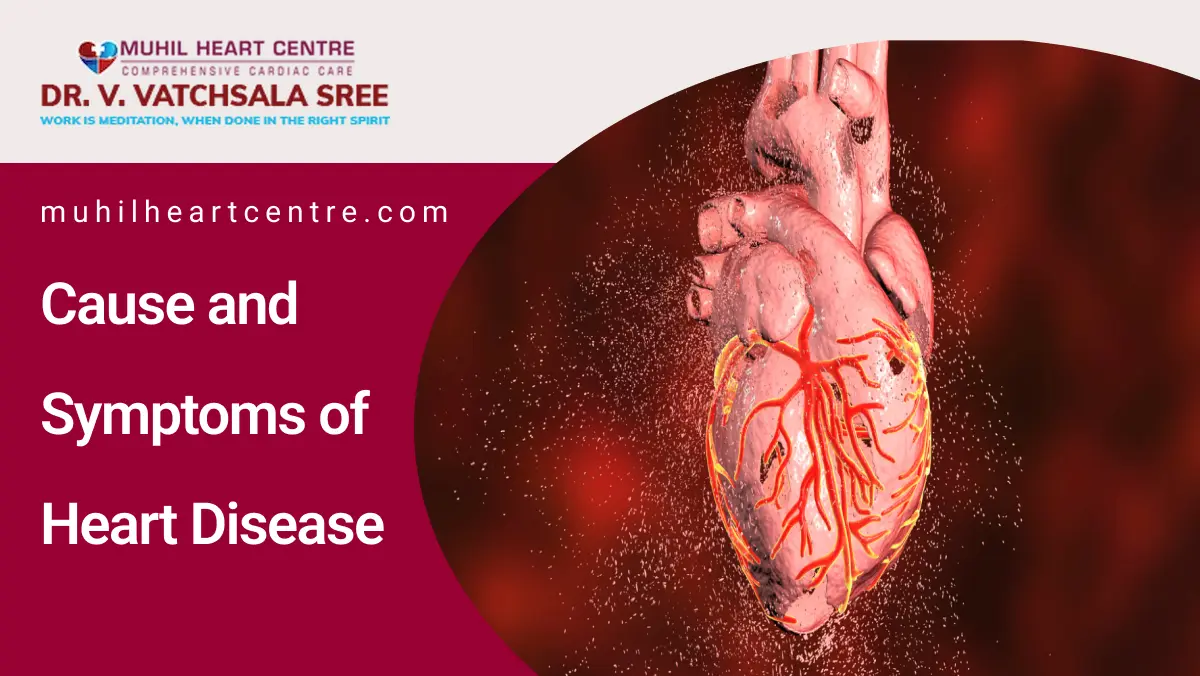Heart disease continues to be a top cause of death globally. Understanding its causes and recognizing its symptoms are crucial for prevention and timely intervention. Often underestimated, heart disease encompasses various conditions that affect the heart’s function, leading to severe complications. Let’s delve deeper into its cause and symptoms of heart disease, and risk factors to shed light on this prevalent health concern.
Cause and Symptoms of Heart Disease
Causes of Heart Disease
Numerous factors contribute to the development of heart disease. One primary cause is the accumulation of plaque in the arteries, a condition known as atherosclerosis. This buildup restricts blood flow to the heart, causing potential blockages and increasing the risk of heart attacks or strokes. Hypertension, high cholesterol levels, and diabetes are significant contributors to atherosclerosis, emphasizing the importance of managing these conditions to prevent heart disease.
Other cause and symptoms of heart disease include congenital heart defects, which individuals are born with, and conditions like cardiomyopathy that weaken the heart muscle. Infections, inflammatory diseases affecting the heart, and lifestyle factors such as smoking, excessive alcohol consumption, and poor diet also play significant roles.
Identifying Symptoms of Heart Disease
Recognizing the symptoms of heart disease is paramount for early intervention. Chest pain or discomfort is a classic symptom, often described as a squeezing or fullness sensation. Shortness of breath, fatigue, and dizziness are also common indicators. It’s essential to note that these symptoms can vary between individuals, making it crucial to consult a healthcare professional if anything seems amiss.
Moreover, pay attention to subtle signs like jaw pain, nausea, or cold sweats, as these can also be indicative of heart issues. Regular health check-ups and awareness of your body’s signals are key components of effective preventive care.
Symptoms of Heart Disease
Recognizing the symptoms of heart disease is crucial for early intervention. Chest pain or discomfort, often described as a squeezing or fullness sensation, is a classic symptom that warrants attention. Shortness of breath, fatigue, and dizziness are also common indicators of underlying cardiac issues. It is important to note that cause and symptoms of heart disease can differ among individuals. Therefore, it is crucial to consult a healthcare professional if anything seems unusual. Being aware of the causes and symptoms of heart disease can help individuals seek medical guidance early on, leading to timely diagnosis and appropriate intervention to mitigate the impact of cardiovascular conditions.
Five Risk Factors for Heart Disease
Here are 5 risk factors for heart disease associated with heart disease:
High Blood Pressure (Hypertension): Elevated blood pressure strains the heart, increasing the risk of heart disease. Regular monitoring and lifestyle modifications can mitigate this risk factor.
High Cholesterol: Excess cholesterol can accumulate in arteries, obstructing blood flow and leading to heart issues. Adopting a heart-healthy diet and medication, if necessary, can manage cholesterol levels.
Smoking: Tobacco smoke damages blood vessels, accelerates plaque buildup, and raises the risk of heart disease. Quitting smoking drastically reduces this risk.
Diabetes: Uncontrolled diabetes can damage blood vessels and nerves, amplifying the likelihood of heart disease. Managing blood sugar levels through diet, exercise, and medications is crucial.
Obesity: Carrying excess weight strains the heart and increases the risk of conditions like high blood pressure and diabetes, contributing to heart disease. A balanced diet and regular exercise aid in weight management and heart health.
Prevention and Lifestyle Changes
The cause and symptoms of heart disease, preventing heart disease involves adopting a proactive approach to one’s lifestyle. Incorporating a balanced diet rich in fruits, vegetables, whole grains, and lean proteins while limiting saturated fats, sodium, and processed foods is crucial. Regular physical activity, at least 150 minutes a week, aids in maintaining a healthy weight and improving cardiovascular health. Smoking cessation and moderation in alcohol consumption are equally vital steps toward a healthier heart.
Conclusion
Understanding the cause and symptoms of heart disease empowers individuals to take charge of their cardiovascular health. By recognizing the risk factors and making conscious lifestyle changes, one can significantly reduce the likelihood of developing heart disease. Regular screenings and consultations with healthcare providers play a pivotal role in early detection and intervention. Stay informed, prioritize your heart health, and take proactive steps toward a healthier future.

